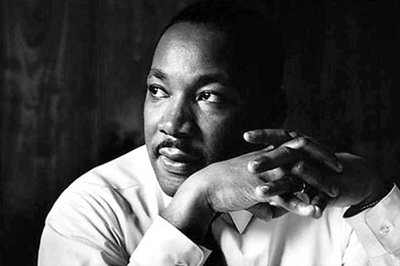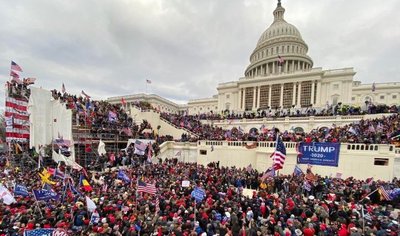For a Google version of this lesson plan, click here. (Note: you will need to make a copy of the document to edit it).
Overview
Money's dominant role in politics leaves many voters feeling their voices are drowned out by wealthy donors whose large campaign contributions have more influence than their single vote.
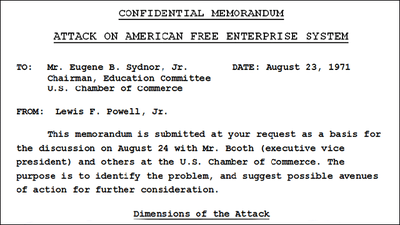
Screenshot of the the Powell Memo by future Supreme Court Justice Lewis Powell Jr., about the role of corporations in shaping laws and policy in American democracy.
Candidates bypass their fundraising limits through multimillion-dollar super PACs, supposedly independent political action committees that spent over 2.5 billion dollars on campaigns in 2024. Billionaires and corporations can hide their identity by donating to politically active non-profit groups that aren't required to disclose their donors. How do regular everyday Americans have a say in their democracy when trust in institutions they've long respected becomes eroded?
Journalist David Sirota is the founder and editor-in-chief of The Lever, a reader-supported news organization, and the creator of the Master Plan podcast. In this lesson, News Hour's Victoria Pasquantonio interviews Sirota about the history of corruption in U.S. politics and how to follow the money in political campaigns, as well as what money means for democracy.
The main video is split up into four parts for students to answer discussion questions along the way. Students can also watch the full 30-minute interview with Sirota here.
Subjects
Civics, government, U.S. history, social studies
Grades
9-12
Estimated time
50-minutes
Objectives
Students will learn about how money can be a corrupting force in politics; how and why certain policies get passed and what they can do to trace campaign donations for their local politicians.
Main activity
Directions: Watch the first video from the interview and answer the discussion questions before moving on to the next segment.
Questions:
- How do wealthy voters take advantage of the one-person, one-vote system in the United States, according to Sirota?
- Sirota says that the power of money in politics makes elections less democratic. Do you agree? Explain why or why not.
Questions:
- What is Sirota's definition of corruption?
- What does Sirota mean when he says that an industry's campaign donations are an investment?
Question:
- How has the United States essentially legalized forms of bribery in politics, according to Sirota?
- How do you think this affects democracy in America?
Questions:
- What happens when you "follow the money" on how policies are made, according to Sirota?
- Why does the United States not have a government sponsored health care system when other industrialized countries do, according to Sirota?
Note: This lesson plan covers the first six of the 11-episode Master Plan series.
Media literacy activity
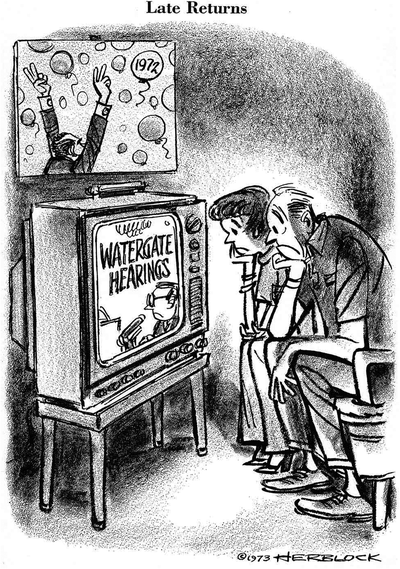
"Late Returns." Watergate hearings editorial cartoon by Herbert Block, 1973. Courtesy of © The Herb Block Foundation.
In the full interview with David Sirota, he explains how the Watergate scandal and a subsequent series of laws and court cases led to the amount of money we see in politics today, where corporations can essentially buy candidates and have significant influence on lawmaking.
Students can follow along chronologically through the modern history of campaign finance while examining the primary sources of these rulings using this resource created by the Center for Public Integrity.
Students can also dive deeper into these cases to learn about the cause and effect of these rulings by using the Oyez.org archive, which contains detailed information on each case including Supreme Court audio and plain-English case summaries.
For example, students can find the two cases that Sirota discusses in the interview below:
Buckley v. Valeo: A 1976 landmark decision by the U.S. Supreme Court on campaign finance in which a majority of justices held that section 608 of the Federal Election Campaign Act of 1971, which placed limits on election expenditures, was unconstitutional.

Screenshot from Oyez.org. How the justices voted in Buckley v. Valeo. Courtesy: Oyez.org
First National Bank of Boston v. Bellotti: A 1978 landmark 5-4 decision by the U.S. Supreme Court stated corporations have a First Amendment right to make contributions to ballot initiative campaigns.

Screenshot courtesy of Oyez.org on the Supreme Court case First National Bank of Boston v. Bellotti, in 1978.
After exploring Oyez.org, students can answer the following questions:
What did the Supreme Court justices rule in Buckley v. Valeo about spending limits of campaign contributions made by individuals? In Supreme Court cases, there is a majority opinion and a dissenting opinion. What were those opinions? How could you find out, if you are not sure?
What effect did Buckley v. Valeo have on First National Bank of Boston v. Bellotti, which came two years later? In Supreme Court cases, there is a majority opinion and a dissenting opinion. What were those opinions? How could you find out, if you are not sure?
What is the significance of these cases in politics today? How have wealthy donors taken advantage of these rulings?
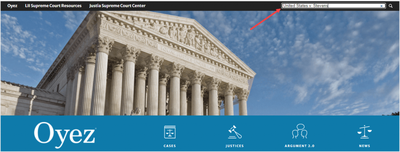
Screenshot from Oyez.org website. https://www.oyez.org/about Courtesy: Oyez.org
Using the Public Integrity page and Oyez.org, can you find another, more recent case ruling about campaign contribution limits?
Extension activity
OpenSecrets.org is a website that allows you to track political funding and lobbying by exploring research data on politicians, corporations and their donors.
For example, students can use OpenSecret's Donor Lookup tool to search for an individual's contributions by their name or explore the website's data on Top Spenders to see which organizations spend the most trying to influence government policy.
Students can also use the Candidates and Officeholders tool to search for campaign contributions for members of Congress, Congressional Committees and even their local state lawmakers.
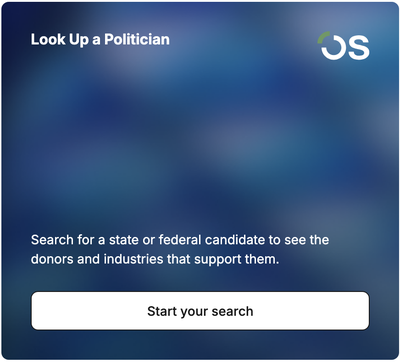
Screenshot from Opensecrets.org. Courtesy of Opensecrets.org
Here's an example:
- Go to the Candidates and Officeholders page and click on Members of Congress.
- Here, students can search for a congressperson by name or select from the list of current members. For this example, select Speaker of the House Mike Johnson (R-La.) or former Speaker of the House Nancy Pelosi (D-Calif.).
- Who was Johnson and Pelosi's top contributor for their 2024 campaigns? Is it a person? Or a nonprofit or corporation?
- How can you find out more about Johnson and Pelosi's top donors and why they would donate to their campaigns?
Students can use these tools and more on OpenSecrets.org as a starting point to learn how to follow the money in political campaigns and then continue their research to find out more about what's happening where they live.
Lesson by News Hour's Victoria Pasquantonio and Gianfranco Beran, production assistant.
Fill out this form to share your thoughts on Classroom’s resources.

